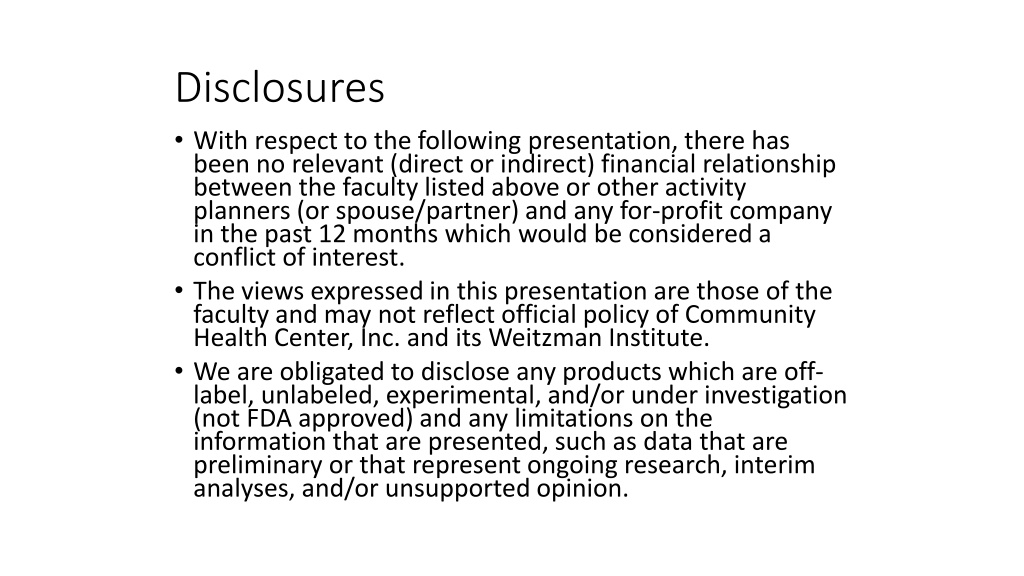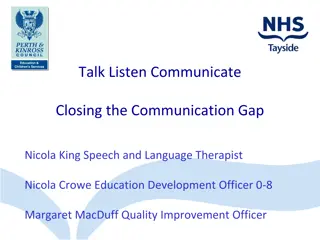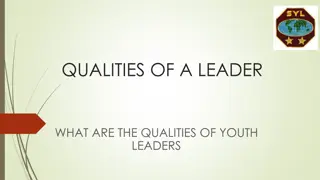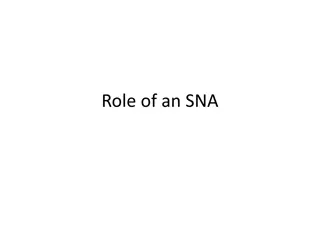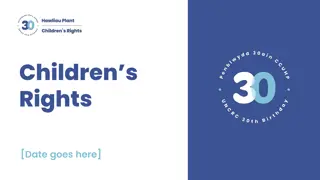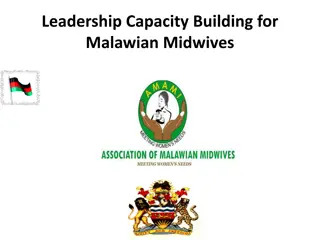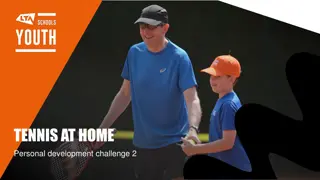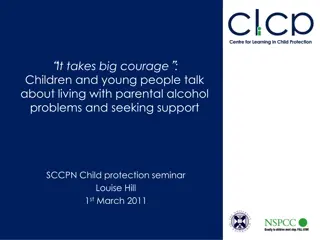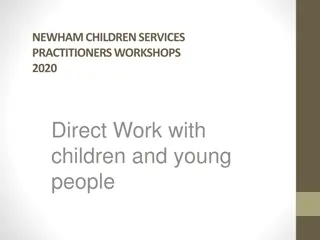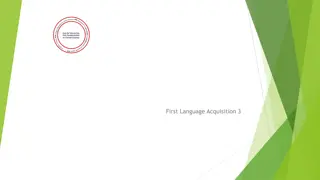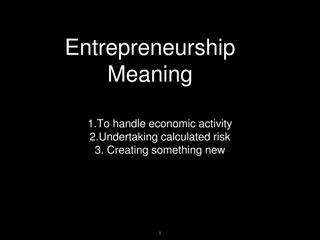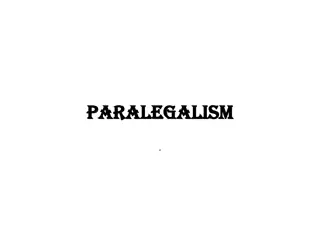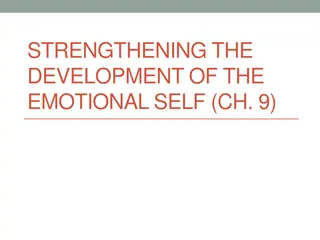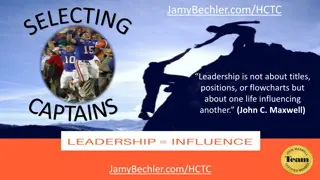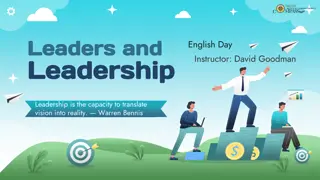Understanding Children's Qualities and Development
This presentation provides insights into the qualities and development of children, emphasizing the importance of nonverbal communication, attachment, temperament, and regulation of cognition, emotions, and behavior. It covers a range of topics from how children experience the world to their individual variations and relationships with caregivers and surroundings.
Uploaded on Sep 26, 2024 | 0 Views
Download Presentation

Please find below an Image/Link to download the presentation.
The content on the website is provided AS IS for your information and personal use only. It may not be sold, licensed, or shared on other websites without obtaining consent from the author. Download presentation by click this link. If you encounter any issues during the download, it is possible that the publisher has removed the file from their server.
E N D
Presentation Transcript
Disclosures With respect to the following presentation, there has been no relevant (direct or indirect) financial relationship between the faculty listed above or other activity planners (or spouse/partner) and any for-profit company in the past 12 months which would be considered a conflict of interest. The views expressed in this presentation are those of the faculty and may not reflect official policy of Community Health Center, Inc. and its Weitzman Institute. We are obligated to disclose any products which are off- label, unlabeled, experimental, and/or under investigation (not FDA approved) and any limitations on the information that are presented, such as data that are preliminary or that represent ongoing research, interim analyses, and/or unsupported opinion.
Introduction to Child/Adolescent Rotation Name/location/ child experience Purpose/info about child rotation Structure of workshops Part 1 CHILD 101 How to conduct a child psychiatric evaluation Part 2 Diagnostics Intro to treatment Part 3 Psychopharm (deep dive) and review of other interventions Levels of care Roles/Consultations
Ice Breaker *What do you think is the best thing/decision you ve done/made in your life? and *What do you think is the biggest mistake you ve made in your life?
Phenomenology for Childhood Marnie Flynn Emily Farb
WHAT DO WE KNOW ABOUT KIDS/QUALITIES WHAT DO WE KNOW ABOUT KIDS/QUALITIES SMALLER NONVERBAL DOMINATES-RIGHT BRAIN! EVEN ADOLESCENTS ARE NOT LIVING IN THE VERBAL WORLD FULLY LESS EXPERIENCED/FEWER TEMPLATES RAPID AND UNEVEN DEVELOPMENT-INDIVIDUAL VARIATION WHAT IS REAL-MIXED TILL AGE 4 LESS TIME ON EARTH SAFETY AND SECURITY PRIMARY ATTACHMENT WIRED OR CONNECTION/RELATIONSHIPS TEMPERAMENT/GOODNESS OF FIT (WITH CAREGIVER AND/OR CULTURE; FAMILY AND SCHOOL) CONTINUUM FROM UNINTERESTED TO SLOW TO WARM TO BALANCED TO EXTROVERTED TO INTRUSIVE POOR REGULATION OF COGNITION, EMOTIONS AND BEHAVIOR VISCERAL RESPONDERS-CODE INTO BODY THRU SENSES
WHAT DO WE KNOW ABOUT KIDS/QUALITIES WHAT DO WE KNOW ABOUT KIDS/QUALITIES ATTEND TO DIFFERENT THINGS-MORE SENSORY BASED MORE IMPULSIVE MORE REACTIVE GENERALLY MORE ACTIVE (VARIES) CONCRETE TILL 14YO-ISH TIME IS ORGANIZED AND PERCEIVED/REMEMBERED DIFFERENTLY *DEPENDENT (NON-VOLUNTARY) LARGER RESPONSES CAUSATION IS NOT ESTABLISHED-GENERALLY THRU TIME AND NOT WITH INTENT OVERGENERALIZE EASILY THREATENED INFLUENCED BY IMMEDIATE FAMILY, THEN EXTENDED FAMILY, SCHOOL AND COMMUNITY NEED SIMPLE SEQUENCES AND MORE CUEING EAGER TO PLEASE AND IDEALIZE PARENTS CURIOUS PLAYFUL
WHAT DO WE KNOW ABOUT KIDS/QUALITIES WHAT DO WE KNOW ABOUT KIDS/QUALITIES FASTER INFULENCE OF PHYSIOLOGICAL CUES (HANGRY) SHORTER ATTENTION DELAY OF GRATIFICATION-MIXED LIVE IN PHYSICAL BODY MORE GULLIBLE/SUSCEPTIBLE TO ADULT INTERPRETATIONS LACK OF KNOWLEDGE INSIGHT LIMITED JUDGMENT MIXED BUT EVOLVES WITH MORAL DEVELOPMENT ALL ADULTS WERE KIDS ONCE!
USING PHENOMENOLOGICAL DATA TO USING PHENOMENOLOGICAL DATA TO PRODUCE SOUND EVALUATIONS PRODUCE SOUND EVALUATIONS GOAL OF TREATMENT FOR MH ISSUES IN CHILDREN IS TO REMOVE BARRIERS TO THE NORMAL FLOW OF DEVELOPMENT AND RETURN THEM TO THEIR NORMATIVE TRENDLINE WINDOWS OF VULNERABILITY WILL SHAPE PATTERNS OF BEHAVIOR AND SYMPTOMS AND GIVE CLUES TO EVENTS, TIME AND PORTRAIT UNDERSTANDING THAT WHAT IS NORMAL BY WESTERN, WHITE STANDARDS IS NOT A UNIVERSAL NORM, MAY BE IN CONFLICT WITH THE VALUES AND CULTURE OF THE FAMILY THIS AFFECTS WHAT WE CONSIDER OBJECTIVE DATA LIKE SCALES AND INSTRUMENTS
KIDS VS ADULTS Developmental perspective- return to developmental trajectory Different task of engagement due to non-voluntary status Systems perspective- parent, child, school, community, PCP etc. DSM 5- poor fit, less central role Reliability / validity of reports; information variance Non-verbal primary up until adolescence Presenting problems- for whom? Hidden agendas, cultural factors, misconceptions
REMOTE VS IN PERSON Some considerations for remote: Privacy, mostly lack thereof Distractions/noise Meeting times challenges with caregivers on different schedules Sibling involvement Motor movements/activity level MSE assessment limitations Missing school/apt availability, resistance to do so w/video apt Vital signs Access to care Seeing home environment (goes both ways) In person Mask Safety Family comfort Childcare and space
Cultural Factors Goodness of fit Values lead to practices How divergent is the presentation from the family s identified culture Assessment tools are biased Religion Immigration status Interpretation of scales
Notes about our Population THE NORMS ARE DIFFERENT AND DIVERGE FROM MAINSTREAM THESE KIDS CANNOT BE OUTSIDE IN THE SAME WAY-TOO HIGH RISK: MORE TV, INSIDE ACTIVITIES LIKE PHONE USE AND VIDEO GAMES MUCH LESS EXPOSURE TO EXPERIENCES IN THE BROADER WORLD GENERALLY, RESPECT IS TOTALLY MORE IMPORTANT TO ALL-THEY LAUGH AT MAINSTREAM PARENTS LETTING KIDS DICTATE TO THE PARENTS, SHOW DISRESPECT TO ELDERS AND OFFER OPINIONS AS EQUALS! EATING AND SLEEPING GOALS MAY ALSO BE DIFFERENT-AS IS WEIGHT MANAGEMENT! NEVER DICTATE FROM OUR EDUCATED/CULTURAL PERSPECTIVE
Notes about our Population PARENTS NEED TO FEEL SEEN, HEARD AND INCLUDED IN THE PROCESS DISCIPLINE SHOULD FOCUS ON STRATEGIES FOR REPARATION AND NOT JUST CONSEQUENCES BE ALERT TO RACISM, MARGINALIZATION, CONCERNS, PARENTAL EXPERIENCE REMAIN NON-JUDGMENTAL AT ALL COSTS-SEEK UNDERSTANDING REMEMBER TO GET THE PARENTS FROM THE OUTSIDE INFO AND FROM THE INSIDE INFO FROM THE KIDS CAREFUL WHO YOU ADDRESS FIRST, ASK PARENT WHO THEY WANT THE CHILD TO ADDRESS YOU EVEN DATA LIKE EYE CONTACT CAN VARY DUE TO CULTURAL NORMS FOR THEM ****REMEMBER TO CHECK ON THE CONGRUENCE AND DO-ABILITY OF ANY PLAN FOR THE CHILD S CARE!!!!! WE MEDICATE THE FAMILY, NOT JUST THE CHILD
